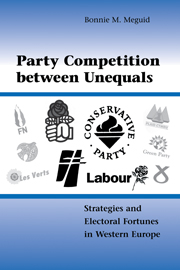Book contents
- Frontmatter
- Contents
- List of Tables and Figures
- List of Abbreviations and Acronyms
- Acknowledgments
- 1 THE NICHE PARTY PHENOMENON
- 2 POSITION, SALIENCE, AND OWNERSHIP: A STRATEGIC THEORY OF NICHE PARTY SUCCESS
- 3 AN ANALYSIS OF NICHE PARTY FORTUNES IN WESTERN EUROPE
- 4 A THEORY OF STRATEGIC CHOICE
- 5 STEALING THE ENVIRONMENTAL TITLE: BRITISH MAINSTREAM PARTY STRATEGIES AND THE CONTAINMENT OF THE GREEN PARTY
- 6 “THE ENEMY OF MY ENEMY IS MY FRIEND”: FRENCH MAINSTREAM PARTY STRATEGIES AND THE SUCCESS OF THE FRENCH FRONT NATIONAL
- 7 AN UNEQUAL BATTLE OF OPPOSING FORCES: MAINSTREAM PARTY STRATEGIES AND THE SUCCESS OF THE SCOTTISH NATIONAL PARTY
- 8 CROSS-NATIONAL COMPARISONS AND EXTENSIONS
- 9 CONCLUSIONS: BROADER LESSONS OF COMPETITION BETWEEN UNEQUALS
- References
- Index
- Cambridge Studies in Comparative Politics
5 - STEALING THE ENVIRONMENTAL TITLE: BRITISH MAINSTREAM PARTY STRATEGIES AND THE CONTAINMENT OF THE GREEN PARTY
Published online by Cambridge University Press: 25 July 2009
- Frontmatter
- Contents
- List of Tables and Figures
- List of Abbreviations and Acronyms
- Acknowledgments
- 1 THE NICHE PARTY PHENOMENON
- 2 POSITION, SALIENCE, AND OWNERSHIP: A STRATEGIC THEORY OF NICHE PARTY SUCCESS
- 3 AN ANALYSIS OF NICHE PARTY FORTUNES IN WESTERN EUROPE
- 4 A THEORY OF STRATEGIC CHOICE
- 5 STEALING THE ENVIRONMENTAL TITLE: BRITISH MAINSTREAM PARTY STRATEGIES AND THE CONTAINMENT OF THE GREEN PARTY
- 6 “THE ENEMY OF MY ENEMY IS MY FRIEND”: FRENCH MAINSTREAM PARTY STRATEGIES AND THE SUCCESS OF THE FRENCH FRONT NATIONAL
- 7 AN UNEQUAL BATTLE OF OPPOSING FORCES: MAINSTREAM PARTY STRATEGIES AND THE SUCCESS OF THE SCOTTISH NATIONAL PARTY
- 8 CROSS-NATIONAL COMPARISONS AND EXTENSIONS
- 9 CONCLUSIONS: BROADER LESSONS OF COMPETITION BETWEEN UNEQUALS
- References
- Index
- Cambridge Studies in Comparative Politics
Summary
In 1989, the British Green Party surprised the political establishment by capturing 14.9 percent of the vote in the European Parliament (EP) elections. Green Party candidates attracted more support than Labour candidates in six constituencies and challenged the Conservatives' hold of two of its safe seats. With its phenomenal electoral score, the Green Party surpassed the Liberal Party to become the number three party in the country.
While some scholars have downplayed the importance of the 1989 victory, this election was seen by the British mainstream parties as a warning. Concern about the environment – and, with it, the membership of the Green Party – had grown in recent years. The level of postmaterialism in Great Britain had increased by 75 percent since the Green Party, at that time named the People's Party, first contested Westminster elections in 1974. By 1989, the environment had surpassed unemployment, the perennial favorite, as the most important problem facing the United Kingdom according to MORI survey respondents (MORI polls).
More importantly for the mainstream parties, this growing public interest in the issues of pollution and nuclear power was influencing voting decisions. Even before the June 1989 EP elections, Green Party candidates were capturing an average vote of 8 percent and peak votes of 14 percent in the May 1989 local county elections (O'Neill 1997: 288). Although supporters of environmental parties are often first-time voters, the British Green Party was stealing voters from the established parties.
- Type
- Chapter
- Information
- Party Competition between UnequalsStrategies and Electoral Fortunes in Western Europe, pp. 110 - 142Publisher: Cambridge University PressPrint publication year: 2008



